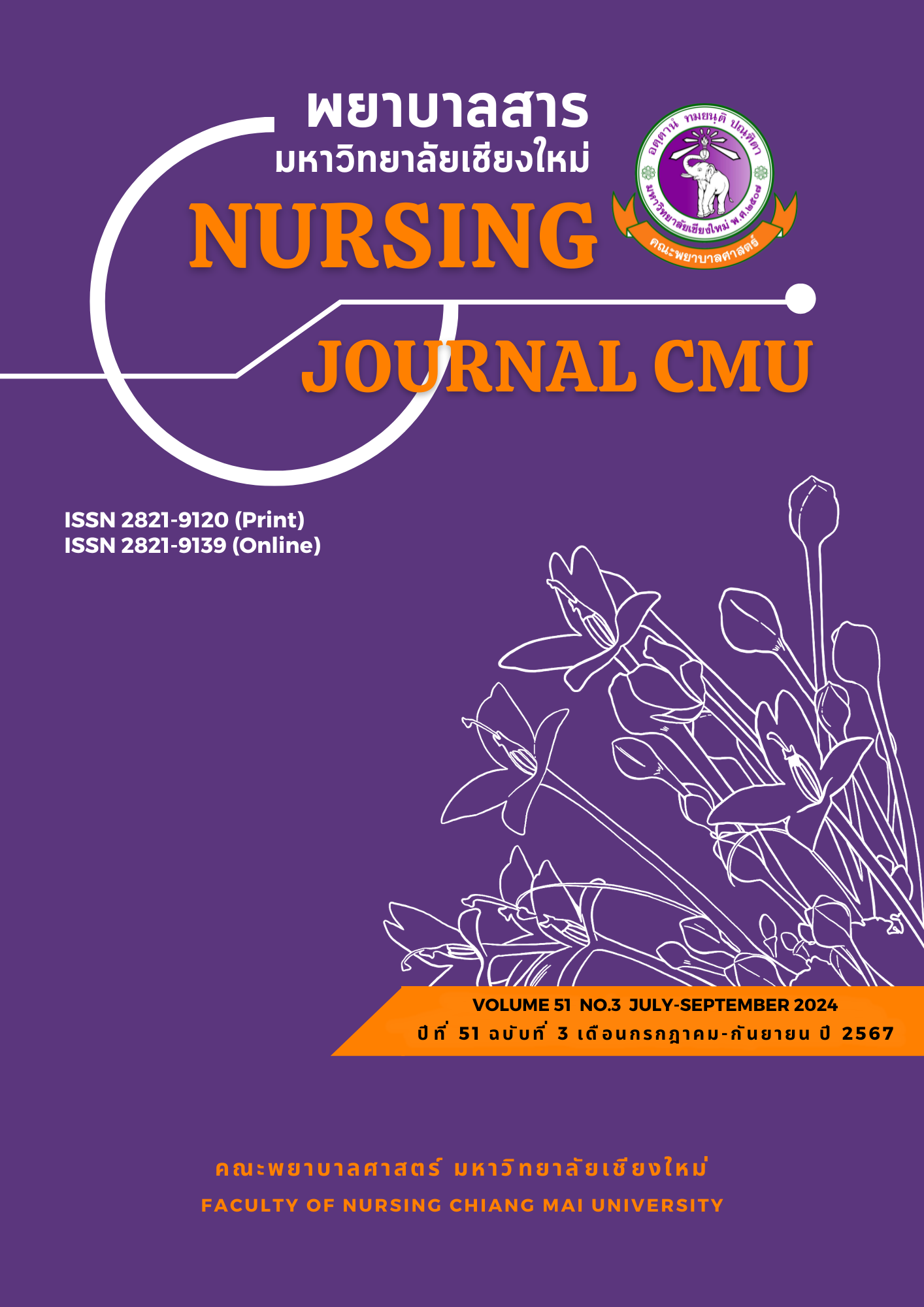ผลของโปรแกรมเตรียมความพร้อมผู้ดูแลต่อทักษะการดูแลและภาระการดูแล ผู้ป่วยหลอดเลือดสมอง: การทดลองแบบสุ่มและมีกลุ่มเปรียบเทียบ
คำสำคัญ:
ผู้ดูแล, โปรแกรมเตรียมความพร้อมผู้ดูแล, ทักษะการดูแล, ภาระการดูแล, ผู้ป่วยหลอดเลือดสมองบทคัดย่อ
ผู้ป่วยหลอดเลือดสมอง มีข้อจำกัดในการปฏิบัติกิจวัตรประจำวัน จึงต้องพึ่งพาผู้ดูแล พบปัญหาผู้ดูแลขาดทักษะการดูแล และภาระการดูแลส่งผลกระทบต่อร่างกาย จิตใจ และสังคมเศรษฐกิจของผู้ดูแล งานวิจัยเชิงทดลองแบบสุ่มและมีกลุ่มเปรียบเทียบนี้ มีวัตถุประสงค์เพื่อศึกษาผลของโปรแกรมเตรียมความพร้อมผู้ดูแลต่อทักษะการดูแลและภาระการดูแลผู้ป่วยหลอดเลือดสมอง กลุ่มตัวอย่าง 72 คน เป็นผู้ดูแลผู้ป่วยหลอดเลือดสมอง สุ่มกลุ่มตัวอย่างเข้ากลุ่มทดลองและกลุ่มควบคุมกลุ่มละ 36 คน ด้วยวิธีสุ่มอย่างง่าย เครื่องมือวิจัยประกอบด้วยแบบบันทึกข้อมูลส่วนบุคคล แบบประเมินทักษะการดูแล แบบวัดภาระผู้ดูแล และโปรแกรมเตรียมความพร้อมผู้ดูแล สำหรับแบบประเมินทักษะการดูแล และแบบวัดภาระผู้ดูแล มีค่าดัชนีความตรงเชิงเนื้อหา (CVI) เท่ากับ .81, และ .75 ตามลำดับ และมีค่าความเชื่อมั่นเท่ากับ .87 และ .82 ตามลำดับ กลุ่มทดลองได้รับโปรแกรมเตรียมความพร้อมผู้ดูแล โดยได้ฝึกทักษะการดูแลผู้ป่วยที่โรงพยาบาลเป็นเวลา 3 วันก่อนจำหน่าย ระหว่าง 6 เดือน หลังจำหน่ายมีการเยี่ยมบ้าน 3 ครั้ง คือสัปดาห์ที่ 1 เดือนที่ 3 และเดือนที่ 6 และติดตามทางโทรศัพท์สัปดาห์ละครั้ง จำนวน 24 ครั้ง วิเคราะห์ข้อมูลด้วยสถิติเชิงบรรยาย paired samples t-test และ independent samples t-test
ผลการวิจัยพบว่า ภายหลังได้รับโปรแกรมเตรียมความพร้อม ผู้ดูแลกลุ่มทดลองมีคะแนนเฉลี่ยทักษะการดูแล (M = 3.21, SD = 0.12) มากกว่ากลุ่มควบคุมอย่างมีนัยสำคัญทางสถิติ (M = 1.81, SD = 0.18, t = 33.44,p < .001) และกลุ่มทดลองมีคะแนนเฉลี่ยภาระการดูแล (M = 15.12, SD = 1.93) น้อยกว่ากลุ่มควบคุมอย่างมีนัยสำคัญทางสถิติ (M = 43.19, SD = 1.10, t = -64.63, p < .001)
โปรแกรมเตรียมความพร้อมผู้ดูแล ช่วยให้ผู้ดูแลมีความมั่นใจในการปฏิบัติกิจกรรมดูแลผู้ป่วยได้อย่างมีประสิทธิภาพ
เอกสารอ้างอิง
ACLS Medical Training. (2024). The NIH stroke scale. https://www.aclsmedicaltraining.com/nih-stroke-scale
Boonsin, S., Deenan, A., & Wacharasin, C. (2021). Factors influencing the burden of family caregiving for survivors of stroke. Pacific Rim International Journal of Nursing Research, 25(1), 102-113. https://he02.tci-thaijo.org/index.php/PRIJNR/article/view/241328/168349
Budratana, S. (2020). Effects of discharge preparedness program among primary caregivers of patients with ischemic stroke in Nong Bua Lamphu Hospital. Nursing, Health, and Education Journal, 3(1), 56-64. https://he02.tci-thaijo.org/index.php/NHEJ/article/view/240666/164332 (in Thai)
Department of Medical Services. (2011). Stroke rehabilitation manual for patients and caregivers. Beyond Publishing. https://www.cmneuro.go.th/qr/05042561-stroke/download/ (in Thai)
Farahani, M. A., Ghezeljeh, T. N., Haghani, S., & Alazmani-Noodeh, F. (2021). The effect of a supportive home care program on caregiver burden with stroke patients in Iran: An experimental study. BMC Health Services Research, 21(1), 346. https://doi.org/10.1186/s12913-021-06340-4
Gray, J. R., & Grove, S. K. (2020). Burns and Grove’s the practice of nursing research: Appraisal, synthesis, and generation of evidence (9th ed.). Saunders.
Junsiri, P. (2021). Caregiver burden among caregivers of stroke patient in intermediate care service of Kosumpisai Hospital. Mahasarakham Hospital Journal, 18(2), 72-80. https://he02.tci-thaijo.org/index.php/MKHJ/article/view/251971/172168 (in Thai)
Kuptniratsaikul, V., Thitisakulchai, P., Sarika, S., & Khaewnaree, S. (2018). The burden of stroke on caregivers at 1-year after discharge: A multicenter study. Journal of Thai Rehabilitation Medicine, 28(1), 8-14. https://www.rehabmed.or.th/main/wp-content/uploads/2018/05/L-438.pdf
Monkong, S., Sirapo-ngam, Y., & Leelacharas, S. (2016). Effectiveness of transitional care program for stroke patients and family caregivers from hospital to home. Journal of Public Health Nursing, 30(3), 84-101. https://he01.tci-thaijo.org/index.php/phn/article/view/96574/75343 (in Thai)
Na-Ek, N. (2020). The guide to critically appraise a randomized controlled trial (RCT) using a CASP tool. Chiangrai Medical Journal, 12(2), 131-155. https://www.pharmacy.up.ac.th/FileUpload/Journal/J1/s9.pdf (in Thai)
Phongprapai, W., Sowanna, N., & Chattrapiban, T. (2022). Time to assess the daily living activities of stroke patients. Journal of Medicine and Health Sciences, 29(3), 149-161. https://he01.tci-thaijo.org/index.php/jmhs/article/view/260788/175866 (in Thai)
Piamjariyakul, U., Smith, C. E., Russell, C., Werkowitch, M., & Elyachar, A. (2013). The feasibility of a telephone coaching program on heart failure home management for family caregivers. Heart Lung, 42(1), 32-39. https://doi.org/10.1016/j.hrtlng.2012.08.004
Pitthayapong, S., Numpoon, J., Wattradul, D., Kolyani, S., & Srisart, A. (2023). Effects of a family caregivers’ capacity building program by telenursing on practices of post-stroke care and activities of daily life of the stroke patients. Thai Red Cross Nursing Journal, 16(1), 115-134. https://he02.tci-thaijo.org/index.php/trcnj/article/view/259999/180237 (in Thai)
Senasana, S., Komjakraphan, P., & Isaramalai, S. (2017). Development of the home- based skill training program for caregivers of stroke patients. Journal of Preventive Medicine Association of Thailand, 7(2), 212-222. (in Thai)
Siriprapapol, S., Panprasert, S., & Didsaprae, S. (2022). Development of a care system for hemorrhagic stroke patients from hypertension at Somdetphraphutthaloetla Hospital, Thailand. Journal of Health Science, 31(Suppl 2), S353-S364. (in Thai)
Tanglakmankhong, K., Hampstead, B. M., Ploutz-Snyder, R. J., Potempa, K., Chantarasena, N., Seesing, S., Sinchareaonlert, W., & Wisetsit, P. (2020). Development of a cognitive screening process for older adults in community. The Southern College Network Journal of Nursing and Public Health, 7(3), 99-114. (in Thai)
Uhm, K. E., Jung, H., Woo, M. W., Kwon, H. E., Oh-Park, M., Lee, B. R., Kim, E. J., Kim, J. H., Lee, S. A., & Lee, J. (2023). Influence of preparedness on caregiver burden, depression, and quality of life in caregivers of people with disabilities. Frontiers in Public Health, 11, 1153588. https://doi.org/10.3389/fpubh.2023.1153588
Utaisang, A., Pearkao, C., Junsevg, K., Sangsaikaew, A., Boonkong, D., & Korcharoenyos, C. (2021). Experiences of family members in caring of stroke patients: A case study in the border provinces of the upper northeast of Thailand. Journal of Medical Sciences, 9(G), 172-179. https://doi.org/10.3889/oamjms.2021.7125
Vielvoye, M., Nanninga, C. S., Achterberg, W. P., & Caljouw, M. A. A. (2023). Informal caregiver stroke program in geriatric rehabilitation of stroke patients: A qualitative study. Journal of Clinical Medicine, 12(9), 3085. https://doi.org/10.3390/jcm12093085
ดาวน์โหลด
เผยแพร่แล้ว
รูปแบบการอ้างอิง
ฉบับ
ประเภทบทความ
สัญญาอนุญาต
ลิขสิทธิ์ (c) 2024 พยาบาลสาร มหาวิทยาลัยเชียงใหม่

อนุญาตภายใต้เงื่อนไข Creative Commons Attribution-NonCommercial-NoDerivatives 4.0 International License.
บทความที่ได้รับการตีพิมพ์เป็นลิขสิทธิ์ของวารสารพยาบาลสาร
ข้อความที่ปรากฏในบทความแต่ละเรื่องในวารสารวิชาการเล่มนี้เป็นความคิดเห็นส่วนตัวของผู้เขียนแต่ละท่านไม่เกี่ยวข้องกับมหาวิทยาลัยเชียงใหม่ และคณาจารย์ท่านอื่นๆในมหาวิทยาลัยฯ แต่อย่างใด ความรับผิดชอบองค์ประกอบทั้งหมดของบทความแต่ละเรื่องเป็นของผู้เขียนแต่ละท่าน หากมีความผิดพลาดใด ๆ ผู้เขียนแต่ละท่านจะรับผิดชอบบทความของตนเองแต่ผู้เดียว






